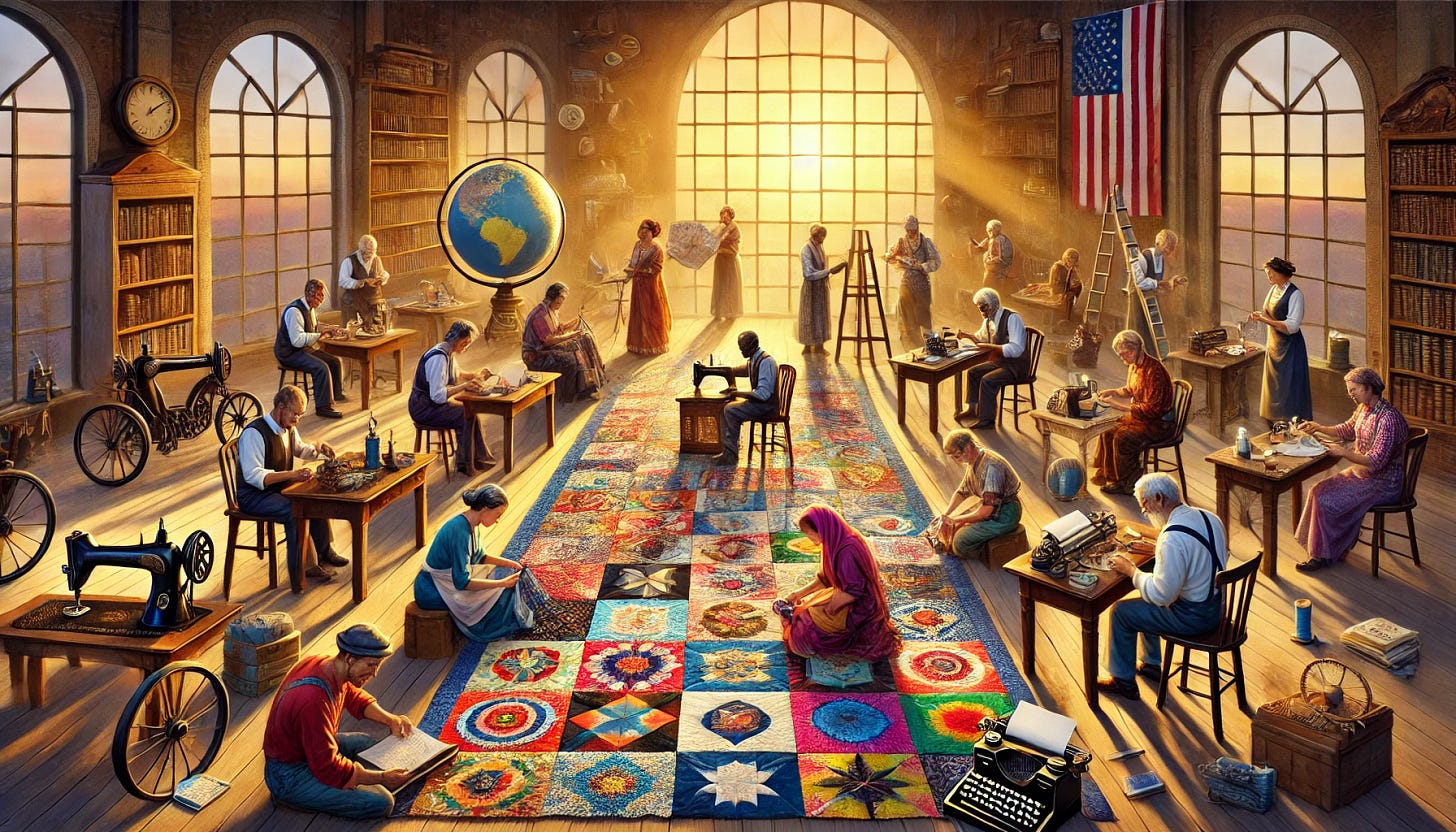Bricoleurs: A Patchwork Revolution
Honoring the Past While Embracing Innovation for Thoughtful Progress
Hello, I'm Maggie, the founder of BeFutureFocused. Since February, I’ve been writing about inclusive workplaces, collaboration, social justice, U.S. authoritarianism, satirical tech critiques, independent media, systemic reforms, decentralized governance, and sortition.
Since 2015, I've had an idea that's been buzzing around in my head, and I think, after 9 years, it's time for me to finally distill, express, and share it: Bricoleurs: A Patchwork Revolution.
What is a Bricoleur?
You might be wondering, "Bricoleurs? Is that even a word?" Yes, it is! It is a French word referring to people who create things from whatever materials are available. Essentially, it describes how we navigate our lives and shape our world.
A bricoleur is someone who uses their creativity and resourcefulness to solve problems, blending old and new, traditional and modern. This term is relevant because it encapsulates the essence of adaptive innovation—finding practical solutions by combining diverse elements. In today’s complex world, being a bricoleur means leveraging all available resources to build a better, more resilient society.
Embracing Tradition and Progress
We live in a time where divisions seem to be pulling us apart—old versus new, tradition versus progress. These dichotomies are everywhere we look. On one hand, we have the richness of our heritage, the lessons learned, and the values that have stood the test of time. These are the elements of our past that ground us and provide a sense of identity and continuity.
On the other hand, we have the exhilarating possibilities of the future, driven by rapid technological advancements and innovative ideas. This progress promises to solve problems that previous generations couldn't even imagine, offering new ways of living, working, and connecting.
Other Sources of Societal Friction
While the tension between tradition and progress is significant, it's not the only source of societal friction. Economic inequality, political polarization, and cultural differences also play crucial roles:
Economic Inequality: The gap between the rich and the poor is widening, leading to disparities in access to resources, opportunities, and quality of life. This inequality fosters resentment and social unrest, making it difficult to create a cohesive society.
Political Polarization: Increasingly, political ideologies are becoming more extreme and divisive. This polarization creates an environment where constructive dialogue is challenging, and compromise is seen as a weakness rather than a strength.
Cultural Differences: In our globalized world, diverse cultural backgrounds often lead to misunderstandings and conflicts. Respecting and integrating these differences while maintaining a shared sense of community is a delicate balance.
The Patchwork Revolution
The clash between old and new, tradition and progress, often creates friction. Those who hold fast to tradition may feel threatened by change, fearing that what is meaningful to them will be lost. Meanwhile, proponents of progress can view the past as outdated, sometimes dismissing valuable insights and practices that have enduring worth.
But what if we didn't see these forces as opposing? What if we embraced them as complementary? Imagine a world where we honor the wisdom of our ancestors while eagerly exploring new horizons. This is not about choosing one over the other, but about weaving them together to create a richer, more resilient fabric of society.
Successful Integrations: Case Studies
Traditional Agriculture and Modern Technology: In India, the use of ancient water conservation techniques combined with modern irrigation technology has led to increased agricultural productivity and sustainability. Traditional knowledge of crop rotation and soil health, integrated with modern scientific methods, helps farmers maintain soil fertility and reduce dependence on chemical fertilizers.
Indigenous Knowledge and Climate Science: Indigenous communities in the Amazon have long used traditional ecological knowledge to manage forests sustainably. Combining this wisdom with modern climate science has helped create effective conservation strategies that protect biodiversity while addressing climate change.
Cultural Heritage and Digital Preservation: The Smithsonian Institution's digitization of cultural artifacts combines traditional craftsmanship with cutting-edge digital technology. This initiative preserves cultural heritage while making it accessible to a global audience, ensuring that traditional knowledge is not lost but shared widely.
Making the Patchwork Quilt
Picture it as making a quilt, but instead of fabric, we're stitching together ideas. We take a piece of wisdom from our grandparents, mix it with cutting-edge technology, and create something that's both comforting and exciting.
But here's the challenge: How do we actually do this? How do we learn from history without being bound by it? How do we embrace the new without discarding everything that came before?
Join the Revolution
I admit, I don't have all the answers. However, I believe that if we collaborate, we can come up with something extraordinary.
So, what do you say? Are you ready to experiment with idea-mixing? Whether you're a history enthusiast, a tech aficionado, or someone who simply wants to see more harmony and less conflict in the world, there's a place for you in this Patchwork Revolution.
Call to Action
If you're interested, drop me a line at hello@befuturefocused.io. Let's start patching things up, one idea at a time.
With appreciation,
Maggie
Stay curious, engage meaningfully, and be the change you want to see.




